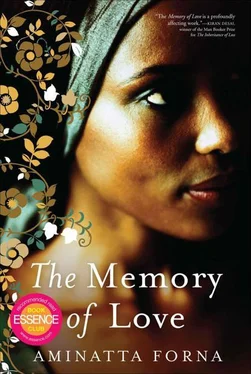She does not remember leaving the house. Later, the child described what happened. Agnes had sent her on an errand in the afternoon, into town to buy fruit for Naasu’s return. The child did as she was bid. She was standing at the market when she saw Agnes hurrying in the direction of the main road. The girl thought maybe Naasu was coming back early and Agnes was going to meet the bus.
Naasu found Agnes five days later. She followed her mother’s footsteps, asking people in every village. In one town, somebody — a niece by marriage — had recognised Agnes, and spoken to her, but Agnes seemed not to remember her. She pointed Naasu in the direction Agnes had taken.
Agnes remembers fragments from those days. But she cannot tell Adrian whether those things truly occurred or were part of her dreams. She remembers taking a foot road, seeing the dust form a whirlwind ahead of her, spinning away. One night she slept in a farm worker’s hut. Another day she watched the clouds moving across the sky, and noticed they were both heading in the same direction, but when Naasu asked her where she had been going she could not say. She was forty miles from the place they both lived. After Naasu brought her home Agnes slept for two whole days.
Agnes reaches the end of her account. She sits facing Adrian, who in turn regards her in silence. He is right, he knows he is right. Everything she has told him today supports his notion. He would not dare to make a diagnosis at this early stage. But nonetheless he is sure of himself in a way he has rarely had occasion to be before.
From under a sheet of paper Adrian draws the gold chain Salia had given him and hands it to Agnes.
‘Thank you,’ she says courteously.
‘It is yours, then?’
‘Yes. This is the one I lost in the ward. I thought maybe it had been stolen.’
Adrian inclines his head. He is aware of Salia watching. Adrian doesn’t tell Agnes what Salia has told him. That the chain had been brought by the man from the old department store, who’d redeemed it from a pawnbroker, one of the many who sat with weighing scales and jeweller’s loupes in the street outside the store.
Agnes herself had pawned it.
Sunday lunchtime. Adrian has managed to borrow a vehicle to go to Ileana’s for lunch. It is the first time he has been behind the wheel of a car in weeks and he sets off, uncertainly at first. The Land Cruiser is much larger than anything he has handled, as well as being left-hand drive. It takes his hands and feet time to recover the memory of driving. Soon he is moving at speed, savouring the mood of independence. He drives in the opposite direction to the instructions Ileana has given him, towards the city, through the dense throng at the roundabout. The heat is rising, he is grateful for the air conditioning, both for the cool and the insulating effect from the dust and noise on the other side of the glass. He turns the wheel of the vehicle to the left and the traffic eases up. On the right is an open stretch of ground, a golf course; directly ahead he can see the sea. The road swings around to the right and Adrian follows it, driving the full length of the beach. Here there is no traffic at all. He turns off the air conditioning and winds down the window, lets the breeze touch his face. At the far end he doubles back at another roundabout. When he reaches the left turn at the end he sees a small road he had missed when he had come from the other direction. Behind a pair of concrete pillars a crescent driveway curves under the arch of a building. Adrian turns in and drives to the car park at the back, descends and makes his way across the uneven tarmac to the building. Three steps lead up to a fountain, an art deco figure of a girl, head tilted back, outstretched arms holding aloft a torch. A trickle of water from the torch runs down the girl’s arms and belly into a small pool of green at her feet, from which a scab-eared dog laps. Behind her, a sign painted upon the wall, in faded letters: Ocean Club Patrons Only .
Parquet floors, bleached and water-stained, a few blocks missing in places. Adrian reaches the top of the short flight of stairs. On one side of the vast space a horseshoe bar, ahead clusters of tables and chairs, to the right a sweeping dance floor capable of holding a hundred couples or more. Morning sun and shadows shimmer on the tabletops, the walls, the stilled ceiling fans. On the far side of the dance floor the building is entirely open to the seafront. All is quiet, save for the sound of the waves. There is nobody in sight as he wanders across the dance floor, feeling strangely vulnerable as he always does crossing an empty dance floor, as though at any moment he might hear a drum roll or the clash of cymbals or find himself suddenly illuminated by a spotlight.
On the beach a score of translucent crabs scuttle from his shadow. Down by the water tiny seabirds, sandpipers, follow the movement of the waves, scurrying after the retreating water, inspecting the sand for whatever has been left in its wake. Hurrying back as the water advances. Detectives scanning the beach for evidence, wings like hands clasped self-importantly behind backs. Adrian is tempted to remove his shoes and socks and walk down to the water, but the practicalities are off-putting. So he heads instead for the bar, pulling up one of the old stools to sit on. Within moments a man appears.
‘Yes, sir?’
‘Beer, please.’ It is only eleven, what the hell.
The barman opens a bottle and slides the beer down the inside of a tilted glass. He flips a beer mat, places the glass upon it and pushes it towards Adrian, who takes a sip enjoying the bite of the cold beer at the back of his throat. The man goes away and comes back with a stainless-steel dish of peanuts. They are tiny, delicious, with salty pink papery skins, a fragment of which gets caught in Adrian’s throat causing him to cough and cough again.
‘Be careful, sir.’
‘Yes, thank you.’ Adrian drains his glass, but is left still coughing. ‘Another beer, please.’
‘First time here?’ says the waiter as he pours the second bottle.
‘Yes.’ It is a question he has grown to dislike. He feels patronised, a new arrival, wet behind the gills — particularly if the questioner is another Westerner.
‘And how do you find us here?’
Adrian nods. ‘I like it very much.’
The bartender nods gravely as though this is as he would have expected. He replies, ‘Maybe you will tell others. And then they will come.’
Adrian drinks his beer. The barman departs and returns with a basin of ice, which he positions on a shelf beneath the bar.
‘Actually,’ says Adrian, ‘I already knew a bit about the country. From my grandfather.’ This is not strictly true, and he is not quite sure why he says it. Perhaps because he is tired of being treated like a beginner. The barman looks up.
‘Your grandfather was here?’
‘Yes,’ says Adrian. ‘A long time ago. Before the war. He was a district commissioner.’
‘What was his name, your grandfather?’
‘Silk.’
‘District Commissioner Silk, yes.’ Neither the barman’s tone of voice nor his expression convey a thing, not even whether he recognises the name or is merely politely concurring. Adrian finishes his beer. By the time he comes to pay the barman has gone again. He counts the money and looks around for the man, noticing for the first time a poster on a pillar behind him. He slips from the stool for a closer look; Mamba Blues. 6 p.m. to 8 p.m. First Monday of the Month. At the Ocean Club . There is an image of a woman’s face partly in profile. It looks like the woman he saw outside the hospital talking to Babagaleh; the angle of the photograph makes it hard to be certain. Adrian looks around for the barman, but there’s still no sign of him, so he places the correct money on the counter and leaves.
Читать дальше












